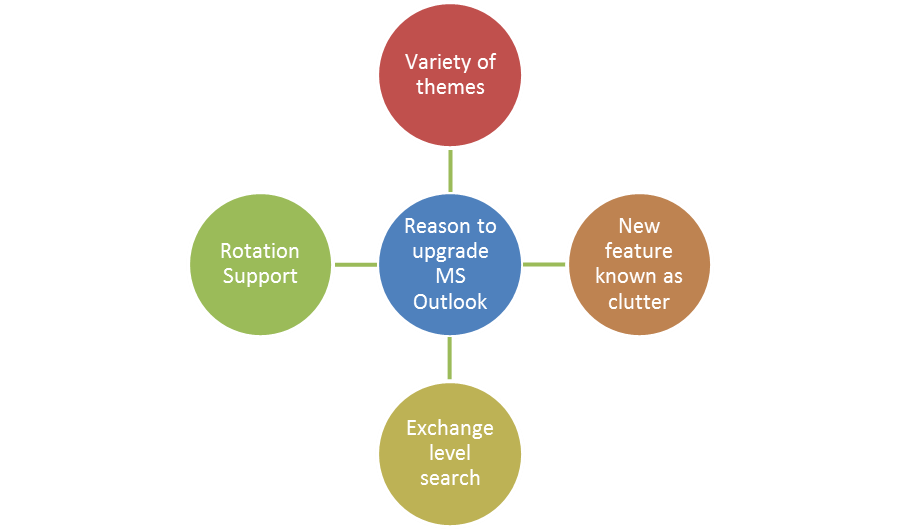
Manage contacts and make notes

Schedule your meetings

Manage different accounts on MS Outlook

Understand about Clutter which will help to manage inbox
As we know in this modern era Email has become one of the most frequently used methods of communication, whether it is used for personal, business or Professionally communications. It doesn’t matter whether you are working in a large or small organisation, email is the most preferred form of communication among the employees.
Nowadays many organisation has decided to implement corporate mail management system for, e.g., Outlook to communicate and organise meetings. It will also help to share your calendar and contacts with others.
Microsoft Outlook training is planned for delegates who have very less knowledge of the Microsoft Outlook 2016 users who want to learn the concepts covered in this course in the 2016 interface. Microsoft has added a new feature in the Outlook known as Clutter it moves emails that users ignored to Clutter to keep the Inbox clean.
Delegates will use Outlook to manage your email communications, including write, manage contact information; read, and respond to emails; schedule appointments and meetings; schedule tasks and create notes; customise message response options, and organise your mail. MS Outlook 2016 also provides different fonts for Arabic as well as Western European languages. This course will provide delegates with the knowledge and skills necessary to be a proficient user.

What is Microsoft Outlook Training?
Microsoft Outlook 2016 provides better organisation, social networking features, search capabilities, and communication. With this Microsoft Outlook 2016 training course, you will learn the four major components of Outlook including contacts, email, calendars and tasks that make things easy for users.
Why Should I take Microsoft Outlook Training?
This Outlook training is suitable for those delegates who want to upgrade their knowledge related to MS Outlook 2016, so they can compose and send, manage personal tasks, scheduling of meetings, and make notes.
Delegates will learn to customise a different set of command, manage different mail accounts, make rules to automate the variety of tasks, set different global options, attach files, check spelling. Apply filters to intercept mail and control spam, manage tasks, handle calendars and contacts, and archive data to protect it.
What are the benefits of Taking Microsoft Outlook Training?
Delegates will learn tasks such as:
Why choose Pentagon Training?
Pentagon Training is known as the best training Provider in all domains.Our instructors are certified and experienced so that delegates will not get difficulty during the course. Pentagon training is one of the most leading training providers of this training due to its high-quality content. It is most trusted by professionals and industry leading brands. Our well trained and experienced instructors teach that what is required by industry.
Enquire Now
----- OR -------
Reach us at +44 1344 961530 or info@pentagonit.co.uk for more information.
Derby is a city and unitary borough in Derbyshire, England. It is located on the banks of the River Derwent in the south of Derbyshire, of which it was usually the county town. At the 2011 survey, the population was 248,700. Derby increased city status in 1977.
Derby was established by Romans who recognised the town of Derventio, who made Derby one of the Five Boroughs of the Danelaw. Initially a market town, Derby developed rapidly in the industrial age. Home to Lombe's Mill, an early British factory, Derby has a right to be one of the birthplaces of the Industrial Revolution. It covers the southern part of the Derwent Valley Mills World Heritage Site. With the influx of the railways in the 19th century, Derby developed a centre of the British rail industry.
Government:
By traditional meanings, Derby is the county town of Derbyshire, although Derbyshire's managerial centre has in recent years been Matlock. On 1 April 1997 Derby City Council turned a unitary authority again, with the rest of Derbyshire managed from Matlock. On 7 July 2014, Derby's first ever youth mayor was chosen. Derby is split into 17 districts.
Geography:
Derby is located in a comparatively low-lying area along the lower valley of the River Derwent and dishonesties between the lowlands and valley of the River Trent to the south, and the south-east foothills of the Pennies to the north which spread to the Peak District National Park further on. The city is surrounded by four national character parts which comprise the Trent Valley Washlands to the south, the Nottinghamshire, Derbyshire and Yorkshire Coalfields in the east, the South Derbyshire Claylands in the west, and the Derbyshire Peak Fringe in the north. Most of the flat plains nearby Derby lie in the Trent Valley Washlands and South Derbyshire Claylands while the hillier northern parts of the city lie within the Derbyshire Peak Fringe and the Coalfields.
Climate:
Under the Köppen climatic organisation, Derby, in the meanness of its distance to large bodies of water, has an oceanic weather along with the rest of the British Isles. The readings are from the closest station available in Watnall, but climate inclines to be very alike between locations and cities in the region, although the Watnall station is located at a somewhat higher elevation, 17 kilometres (11 mi) to the north.
We are offering more than 250 courses at 91 locations in UK.